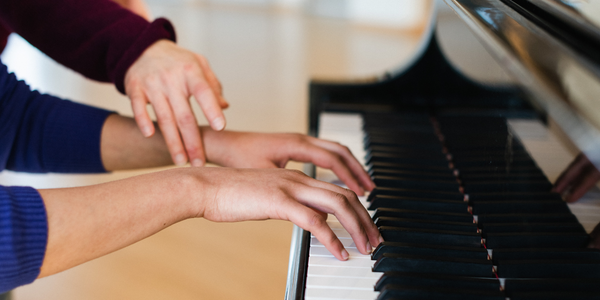We would like to thank Sara Ernst for participating in this interview answering questions about effectively teaching young students. Interested in learning more from Sara Ernst about teaching elementary pianists? Attend our 2024 Summer Intensive Seminar: Teaching Elementary Pianists. Learn more by clicking here.


What are your thoughts on having parents involved with practice? When do students need to start being independent from parent help or is that not much of a concern?
My initial short answer to this is: if a parent will practice with the child, then the parent must be involved in the lesson. This will support the child and keep practice focused on goals given by the teacher. My other short answer is: parental support is always needed to schedule the household for regular practice to occur.
I know that children can practice on their own, but I also know that structure is often needed from the parent to ensure complete work. Furthermore, some children feel insecure at the piano alone, while others have never practiced with a parent! In other words, the level of parental participation should be determined by the developmental needs of the child. Some parent-child practice partnerships work well, although the child must be allowed and encouraged to have independent time at the piano to develop agency and intrinsic motivation. Occasionally, I need to encourage parents to embrace the child’s autonomy.
How long do you expect your youngest students to practice and for how many days a week?
My guidance to parents is based on several simple rules:
- Always practice the day before and after a lesson.
- Never skip two days in a row.
- Aim for five or six days a week.
- Complete the whole assignment every practice day.
Following these guidelines yields at least four days of practice. If assignments are fully completed, and there are four to six days of practice, I find that my students make regular and consistent progress.
The only guideline on practice duration that I maintain is “completion of the assignment.” I estimate my early beginner practice assignments to be 20 minutes in length. As students advance, we discuss length of practice more purposefully, as relates to their goals for study.
What kinds of things do you assign your students to practice? Mostly warmups and rep or other activities as well (theory, off bench, etc.)?
My students’ assignments have warmups, new music, review music, and performance repertoire. Warmups include five finger-patterns, chords, progressions, scales, and arpeggios, although often not all at the same time. New/review music will also include quick-learn and for-fun pieces, to result in routine reading and learning of music. Assignments may include etudes and creative skills, like harmonization and lead sheets. Some of my students’ assignments also include supportive activities, such as sight-reading or theory writing pages for review of important concepts. This last category varies widely based upon the needs of the individual.
What kind of lesson notes do you give students to help them during their practice times? I’m constantly trying to figure out that line between too little instruction that the assignment is not clear and TOO MUCH detail that they never bother to read it.
One of the principles I discuss in my article is developing student ownership. While I give my students typed assignments (printed out or sent electronically), I encourage them to write in their music, and mark all the elements and details that we work on in lessons, in their own handwriting. The assignment sheet will then have weekly goals, written in a concise style. For instance, the student will have formal sections, brackets, and stars written in the music, and the assignment sheet will indicate, “Complete brackets and stars. Play each section 3x slowly.”
How do you help a young student practice in a way to prepare for a performance?
This is such an important question, and it is a style of practice that can be overlooked. I work with my students to develop their artistic vision for each section of the piece. I coach them through each section, having them play the section multiple times in a performance flow, seeking to hear better sound each time. This is balanced with slow, purposeful repetition, to secure accurate playing. As the performance nears, I coach them through complete rehearsals, again with a performance mindset of artistic listening.
Interested in learning more from Sara Ernst about teaching elementary pianists? Attend our 2024 Summer Intensive Seminar: Teaching Elementary Pianists. Learn more by clicking here.
More on teaching young pianists
- MAGAZINE ARTICLE: Practicing Alongside our Intermediate Students by Sara Ernst
- WEBINAR ARCHIVE: Practicing Piano Through the Early Stages by Sara Ernst
- WEBINAR ARCHIVE: Young Pianists Power Up: Building Knowledge and Skill Through Warm-Ups by Sara Ernst
- COURSE: The Beginner Course: Establishing Strong Foundations for Young Pianists, led by Sara Ernst
- MAGAZINE ARTICLE: How Do You Incorporate Group Teaching into Your Work with Elementary Level Students? by Kathleen Murray, Amy Glennon, and Catherine Walby
- Use our search feature to discover more!